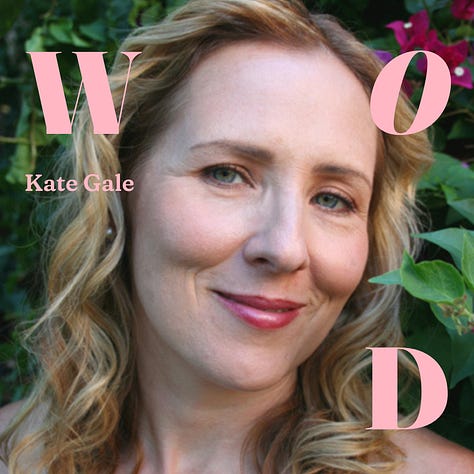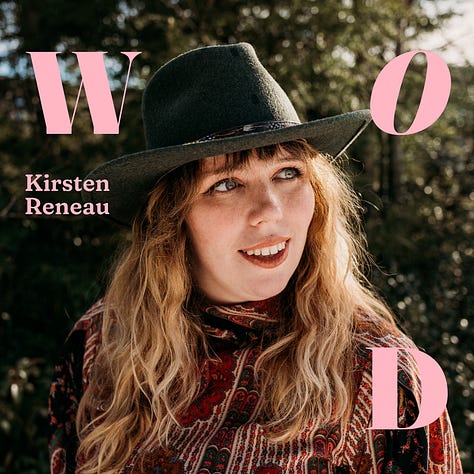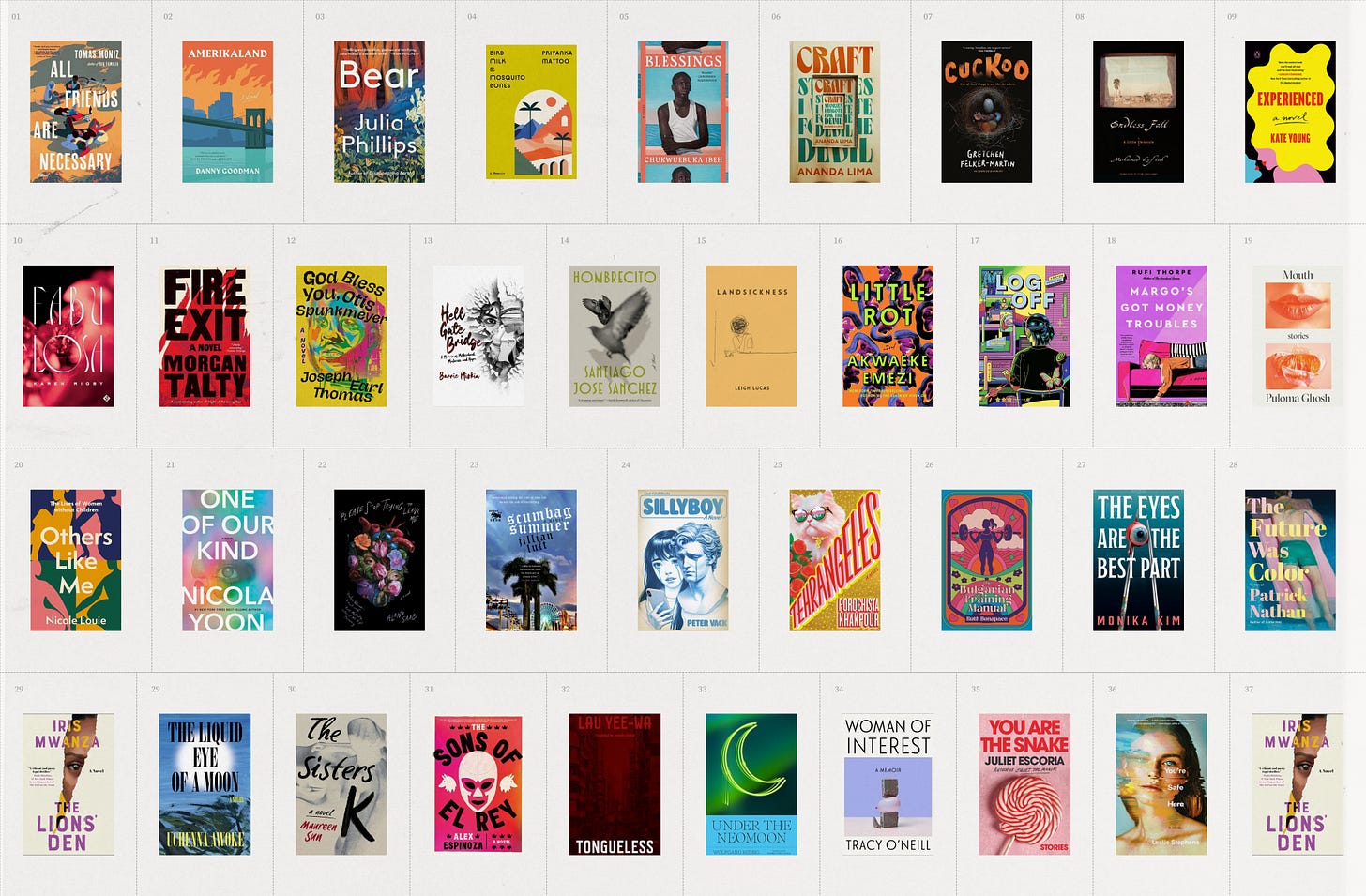Going Towards the Heat, How to Submit to Us, Movie/TV Recs and a Month of Author Interviews
Write or Die Magazine Updates: May 2024
Each month, you will receive this special newsletter with a recap of what our magazine published the month prior and what our editors have been up to. As the Write or Die Mag team, we will share what has been inspiring us, along with craft tips and opportunities to work one-on-one with us! We also created a special space for past contributors to our magazine so they can keep us in the loop and share any writing or publication news. Keep scrolling! <3
Submit to Us! We are open for…
Creative Nonfiction
We are interested in essays that focus on the writing life and especially love work where the personal intersects with the critical.
Author Interviews
We accept pitches from interviewers interested in covering authors with a forthcoming or recently published book. We are especially interested in featuring books by debut authors and/or books published by indie presses.
Fiction
Our regular submission period is closed until the Fall, but you can submit to us and hear back within one week, all year round! Bonus: all fees go directly to pay our editors, who volunteer their time generously to make this magazine what it is <3
Also open for…
Editorial feedback on your fiction or nonfiction pieces. Work one-on-one with our editors and get your work ready for publication!
↓ Click the button below for additional details about what we are looking for and how to submit it! ↓
How To Write Egoless Prose, At Least For a Little While by Steve Almond via LitHub from Truth Is the Arrow, Mercy Is the Bow: A DIY Manual for the Construction of Stories
This essay, which first caught my attention after my friend and fellow writer Nicholas Claro shared it on social media, arrived exactly when I needed it. Few essays have so clearly articulated the bizarre dichotomy between the absolute belief in the prowess and power of your own writing and the shattering, numbing fear that you’re a complete fraud. As I struggle to complete a novel manuscript, my daily moods swing between wild confidence and severe imposter syndrome. I blazed through the first 50K after months of outlining (always!), and I am still so happy with the words I produced on the page. But, for the last year, I’ve been struggling to complete the project despite still feeling passionately about the characters and the story. This isn’t my first rodeo. I’ve never take this long to complete a manuscript, never both believed in and doubted my own skill so fiercely. As the essay opens, Almond boils down the process of writing to decisions:
It will help to take a step back from the keyboard and consider the essential nature of the activity. What is writing, if you boil away all the romance? Writing is decision-making. Nothing more and nothing less. What word? Where to place the comma? How to shape the paragraph? Which characters to undress and in what manner? It’s relentless.
If you refuse to pass judgment on these decisions, if you walk around thinking you’re the Messiah, you’ll wind up settling for inferior decisions, by which I mean imprecise, contrived, solipsistic ones. If, on the other hand, you condemn your decisions, you’ll lose the improvisatory momentum upon which all narrative construction depends.
Yes, I’ve heard this before, and, yes, it seems like pure common sense. We all know this to be true. But I am a big believer that sometimes we just need the right words said the right way by the right person in order for it all to click. Here, it clicked for me. You’ll have to read the essay, but Almond goes on to say that the answer arrives in the form of being capable of holding space to analyze our decisions while also still believing in our talents. For some reason, thinking about each sentence, paragraph, descriptions, piece of dialogue, plot beat, etc. etc. etc. as a decision made me feel so much lighter. It made approaching the page feel easier, more possible. As the essay continues, he moves to talking more directly about writer’s block, which is really a conversation about ego and fear and death and perfectionism and passion and insecurity and self-doubt and yearning and love and every other thing ever.
OKAY. I could go on. Just read the essay!
, assistant interview editor
Recommending the film Wildcat for every writer out there!
I am always highly irritated by people who imply that writing fiction is an escape from reality. It is a plunge into reality and it is very shocking to the system.
I’ve since purchased The Complete Stories of Flannery O’Connor and can’t wait to dive in. Ethan Hawke directs and his daughter, Maya Hawke, stars as Flannery herself!
Shelby Hinte, associate editor
I don’t watch a lot of TV (I get distracted/bored too easily), but The Sympathizer (based on the book by Viet Thanh Nguyen) is absolutely captivating. I didn’t expect to be so engrossed in a war story, but it’s a lot more than your typical historical feature. It’s an art experience about how storytelling creates who we are or who we pretend to be. A truly transportive show with an interesting narrative form. Plus, Sandra Oh for the win!
, editor in chief
I’m going to be super cringe and recommend my own podcast, but only because
guested, and she gave some amazing advice for artists and writers working through the fear of sharing their work. She talks about vulnerability, doing it for the process, and how she overcame her fear of branching out.You have to ultimately be doing it for the process because there's no way that you can ever control a response. If you're doing it so that people like you, you're never gonna be happy. Your dreams will never feel like they've come true even if they have.
Our assistant fiction editor, Suzanne, is a collector of craft tips. She will share her favorite tidbit of the month with us in each issue!
On going toward the heat:
I recently sent a text to my fellow editor Tamar about a piece of advice I heard from Lauren Groff years ago. I don’t recall the exact quotation (It’s written down in one of the many daily writing notebooks currently stacked up in my closet), but it’s something like this: Go toward the heat.
I think of this often, but for some reason I’m only now truly putting my own interpretation of this craft advice into practice. Now, when I begin a scene or section of extended narration, I start by focusing only on the moments in which I’m most interested. A bit of description. A line of dialogue. A perfect moment of interiority. I always outline, so I already have a rough idea of what the section needs to accomplish. But, rather than trying to write my way into it and carry through in a linear fashion, I allow myself to get down all the hottest, juiciest bits first. Often, I get stuck with the connective tissue, the moments of transition from one narrative mode to the next. It discourages me and makes me lose the heat. So, for now, I’m diving right into the things I am most excited to write while my mind is fresh and the passion is in surplus. Then, while editing (I always take a pass at the end of a writing session and then the next day edit what I’ve written previously), I work more studiously on connecting everything together and making sure I’m hitting all the right notes. I’m so excited about this method, and I hope someone else out there finds it to be useful, as well.
Note: While typically, we have essays and fiction to promote, this past month, we had to take a brief pause to catch up on submissions and edits. We did, however, publish NINE author interviews! Get ready for enough writing advice and motivation to fuel a jet pack.
Author Interviews









Kate Gale: On Writing a Pandemic Novel, Running a Small Press, What It Means to Be a Literary Citizen, and Her Debut Novel ‘Under a Neon Sun’ by Brittany Ackerman
Published: May 2
Be a good literary citizen. Be part of helping other writers. Help with a literarymagazine, press, or series. That way, when you meet the editor of your choice, you can talk with them about the work you both do. But also, do it because you want to be part of making stories happen in the world.
Kirsten Reneau: On Writing Prompts, Experimental Forms in Essays, the Importance of Observation, and Her Debut Essay Collection, ‘Sensitive Creatures’ by Brittany Ackerman
Published: May 7
I am working with some big, messy emotions and difficult to talk about subject matter, but by putting it into a strict container, it actually allows for more creativity to bloom and a way to directly handle the essay’s focus.
Sejal Shah: On the Architecture of Writing, Creative Collaboration, Exploring the Spaces In-Between, and Her Short Story Collection, ‘How to Make Your Mother Cry: Fictions’ by Nirica Srinivasan
Published: May 9
I believe in erring on the side of gratitude. The artist's life is not one that's easy, but one that's very rich, if you're lucky enough to have conversation partners, collaborators, people who you think through some of this artistic work that we do on our own.
Fiona Warnick: On the Hunt for a Perfect Croissant, IRL Versus Digital Relationships, and Her Debut Novel, ‘The Skunks’ by Brittany Ackerman
Published: May 14
We need to get better at redistributing the things we already have instead of trying to get new ones, both economically and within ourselves.
Nicolette Polek: On Cultivating Silence, Solitude, and Prayer in Writing and Her Debut Novel ‘Bitter Water Opera’ by Nirica Srinivasan
Published: May 16
Some say to “write what you know,” but the writer always writes what she perceives. It is from a particular way of seeing—through a specific, embodied vantage point—that truly special writing is born.
Rita Bullwinkel: On the Strangeness of Sports, Writing as an Act of Control, and Her Novel ‘Headshot’ by Brittany Ackerman
Published: May 21
For me, writing is an incredibly controlled and calculated act. I cannot think of an instance when it would be beneficial to be “scrappy on the page.”
Julia Hannafin: On Obsession, Sex, Grief, Addiction, and Their Debut Novel ‘Cascade’ by
Published: May 23
Love to me, in the past, could feel like a way to build a new version of oneself or climb a ladder out of whatever you're experiencing.
: On Secret Formulas to Write More, Writing the Book You Want to Read, the Epistolary Novel, and Her Novel ‘Dear Edna Sloane’ by
Published: May 28
People start to think they need to find the right software to help them write the book, or that there’s a formula out there to discover, or if they use a certain program. It all feels like procrastination. Just write. Spend that time writing a bad draft and messing up. That’s going to teach you so much more than studying a thousand things about writing
Danielle Chelosky: On Immortalizing Yourself Through Writing, Annie Ernaux, The Pressure to Publish Young, and Her Debut Novel ‘Pregaming Grief’ by Shelby Hinte
Published: May 30
Writing about your life is hard. But I don't think I care that much about how I'll perceive it in the future because I'll probably just be working on something else and rushing to keep up with time.
Features
37 Books We Can’t Wait to Read: June 2024 by Kim Narby
Find out what fiction, nonfiction, and poetry are on our radar for this month!
We ask our past contributors to keep in touch and let us know if they have writing or publishing news after being featured in Write or Die Magazine! We are so honored to have published these writers and their work. Here is a look at what they've been celebrating since their appearance in our mag!
Author of an interview with Michael Wheaton published on February 20, 2024
News: I made it to Round 2 in this year's March Xness tournament with my essay about "Mr. Brightside" and all the ways a song can feel like home!
and
I wrote an essay formatted as a search history about my relationship to fear and a favorite horror film; it was just published in Bright Wall/Dark Room's "Obsession" issue!
Author of “Making Love Like A Writer and Writing Like A Lover: Desire, Sex, and Annie Ernaux” published on June 21, 2023
News: I'm going to be writing monthly (hopefully) articles on Coveteur magazine. Find the latest here
Author of the essay “Writing: A Checkpoint” published on October 18, 2023
News: I want to share a long, personal essay I published on my Substack called "Hi! I'm Autistic." In the true spirit of the essay, it moves (meanders?) toward integration of my Autism diagnosis, received only recently at the age of 36. It begins the work of looking at the intersection of creativity & neurodivergence, but it also attempts to describe the strange / liberating process of noticing where and how my Autism shows up all throughout my life, both creatively and otherwise.
and
I just had a really big essay published in Hobart Pulp. It was named an Honorable Mention during their recent Creative Nonfiction contest. It's called, "Swan Singing." Thank you so much for your time and energy!
Author of the essay: “The Problem with the Evangelical Story Structure,” published on April 3, 2024
News: A personal essay about killing chickens and renegotiating faith, published at Psaltery & Lyre











Thank you so much for including me! 😊